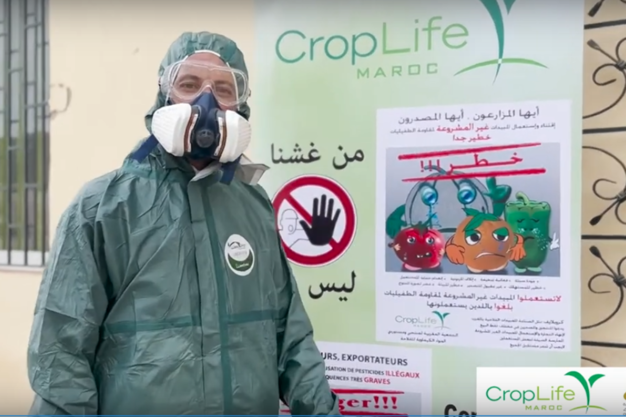The withdrawal of several active substances from phytopharmaceutical products authorized by the European Union has caused confusion among Moroccan growers. CropLife, the association grouping suppliers of plant protection products in Morocco, sponsored an impact study in November to navigate the adaptation to the new regulations.
Boubker El Ouilani, President of CropLife, shares the findings of the study: "The impact study carried out by Dr. Ezzahiri, Dr. Bouhache and Dr. Chtaina shows that the series of massive and hasty withdrawals has disrupted the phytosanitary sector and blurred the vision of professionals with regard to their activity and growers with regard to the sustainability of production systems based essentially on withdrawn key PPPs (phytopharmaceutical products). The effects of the withdrawals have not been felt by farmers because of the drought, except for a few crops such as tomatoes and citrus fruit. Some farmers are aware of the difficulties they will face in the medium term with more expensive treatments and the risk of dealing with resistance by increasing treatment doses and frequencies, while others are simply deferring the problem until the products withdrawn and in circulation are exhausted."

"Crops threatened by the development of resistance of certain bio-aggressors to the remaining active substances are sugar beet for cassidinae and cercospora beticola, potato for downy mildew, several early vegetables and strawberry for gray mold, apple for scab, olive for olive fly and citrus orchards and fruiting rosaceae for certain problematic weeds," El Ouilani continues.
According to the study, in the absence of new products or protection innovations, the withdrawal of active substances can have an impact on pest control, resulting in partial or non-existent phytosanitary protection, yield losses of 5 up to 70%, quality losses, an increase in costs of 5 up to 30%, and a drop in the profitability of agricultural production. In addition, the study anticipates the re-emergence of certain bio-aggressors, the amplification of the phenomenon of resistance to phytosanitary products, and consequent food insecurity.
The ban on active substances will eventually be further extended, El Ouilani shares: "According to the substitution principle newly introduced in the EU, and if we follow the EU's logic, more than 70 active substances will eventually be re-examined in Morocco. Many of these substances are important and widely used in Morocco, which would put farmers in a certain impasse."
To address this alarming situation, the impact study sponsored by CropLife issued a series of recommendations, including:
- Encouraging public-private collaboration for studies and trials to promote new innovative chemical and biological approaches, and activating the registration procedure for innovative PPPs.
- Following the zoning principle, decisions to withdraw active substances based on their environmental impact should be based on Moroccan, not European, scientific evidence. Risk assessment procedures adapted to Moroccan conditions should serve as the basis for decision-making.
- Following the example of EU countries, it is necessary to make regulations more flexible by granting emergency derogations to allow the temporary use of a pesticide for uses for which there are no alternative solutions, or derogations of necessity that allow the use of PPPs in special circumstances.
El Ouilani concludes, "Work to raise awareness among farmers and growers of good phytosanitary practices is needed to support the efforts already made by the institutions concerned (ONSSA and ONCA) and CropLife Morocco."
Pour plus d'informations:
Boubker El Ouilani
CropLife
Tel: +212 5 22 66 53 02 / +212 5 22 66 53 03
Email: [email protected]
www.croplife.ma
